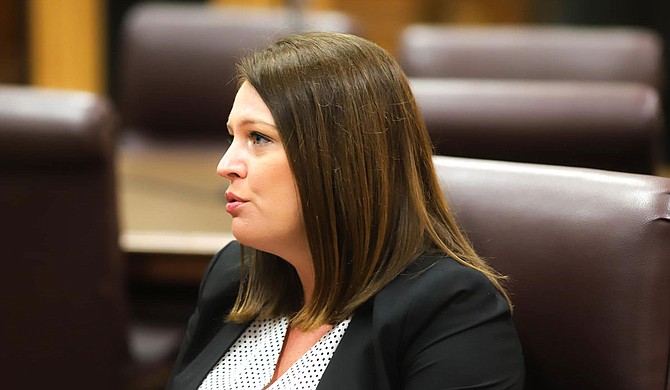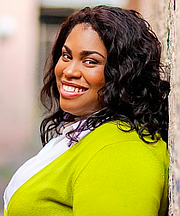The excitement over Shanda Yates' win in Mississippi, and how she did it, offers lessons that political strategists must stop ignoring. Photo courtesy Women for Progress
If the last week has proved anything, it's that people in the U.S., in Mississippi and especially in the Jackson metropolitan area are excited about a political newcomer, Shanda Yates, defeating a long-time incumbent for the District 64 seat in the Mississippi House of Representatives. The viral traffic on our website this week of people reading and sharing stories about her win proves that voters want to be inspired and excited about elections, as do all the comments I've seen as people shared the story. So far, the post on my personal Facebook page shows more than 6,000 shares.
It would be easy, and wrong, to say the traffic is from national Democrats touting such a local win in Mississippi, and that is happening, too. But what the shares of Ashton Pittman's initial story on Yates' win, and a follow-up about help she got, shows is that Mississippians of all ages, races and backgrounds are excited by her win and a positive, straightforward campaign that didn't involve the candidate shootin', huntin' or pretending to be almost as conservative as the Republican in the race.
What is exciting about Yates' win, partisanship aside, is that she ran a positive, hopeful, solutions-focused, shoe-leather campaign that believes in the potential of Mississippians to do good things and make better decisions. It wasn't designed around chicanery and "oppo" (the nickname for the "opposition" dirt that drives most Mississippi campaigns, TV ads, misleading glossy mailers and testosterone inside campaign headquarters.
Yates brought a new kind of energy to her campaign—far beyond crunching "VAPs" and campaigning down to voters assumed to not be very smart as we see so often. She and her husband and volunteers knocked on 10,000 doors in the Jackson metro. She also told me when we met to record a "Let's Talk Jackson" podcast after the election that she ignored advice that told her to put her energy into swing voters rather than the Democratic voters that presumably brilliant strategists assume will fall in line and turn out on cue and vote for the Democrat anyway.
Put simply: The conventional (and losing) wisdom in typical Mississippi political circles is that candidates need to scrap for the same pool of (white and pretty conservative) voters in our state, gather up a lot of "oppo" and take other Democratic voters, such as those in the city of Jackson, for granted. Because, you know, wink, wink, they understand what's going on.
Time to Stop Taking Voters for Granted
I've watched it happen for years with my newspaper, which is focused first on the capital city, where we have very engaged, diverse readership—voters Yates targeted head-on. And let's be honest, black Mississippi-born women are probably our strongest, most devout readership. But even as our readership has strengthened over the years, so many Democratic candidates take them for granted. And they are told to avoid looking like they are trying to get "liberal" voters by addressing them head-on and publicly. (Remember that Hood's campaign waited until the night before the election to put the robocall from Barack Obama.)
Mississippi Democratic Party Needs to Overhaul Strategies, Outreach, Diversity
Donna Ladd writes that Angie Thomas is leaving Mississippi—and calls for Mississippi Dems to truly invite all voices to the table going forward.
In a related conversation, I told a black woman leader last week that Jim Hood didn't spend one dollar to advertise to my readership in his race for governor, and her face was a mixture of anger and disbelief. Neither she nor I were shocked because there is not an obligation for candidates to advertise their messages in any publication, but because avoiding media that key voters consume communicates who they think is important and who they take for granted. The messages Jackson-area voters got from campaigns largely came through television ads either soaked with guns and trucks for rural white voters or dirt on opponents. And recall that Hood wasn't exactly known as a stellar candidate to many black voters due to ham-handed responses to blackface questions that deserved a thoughtful response; his unsuccessful prosecutions of Hinds District Attorney Robert Shuler Smith; and his rather-abysmal criminal-justice record—he supported firing squads and wanted Michelle Byrom executed.
It's sad when Republicans in Mississippi are at least looking more progressive on criminal-justice issues than the Democratic leaders.
The same woman leader told me her kids saw Hood's gun-dog-truck ads and commented that he was clearly not trying to appeal to black voters. Let's just say, he had some public-relations work to do in Jackson.
People aren't idiots. And they don't want to be taken for granted.
Chism: Focus on Jackson Voters
I was happy to see Democratic pollster Brad Chism address this Jackson problem in a recent post about the election outcome, as reported by Ashton Pittman. In his post, Chism said that Democrats need to focus more on the Jackson metro area in its statewide campaigns. Of course that is true: Jackson is the capital city, we are majority black, and we can account for a lot of votes, and even more when our voters are taken more seriously and inspired to turn out because candidates listen to them and openly address issues that matter to residents of the capital city.
Beyond my newspaper, we are also a low-information city poorly covered by "statewide" media, with mostly horse-race political journalism serving us, and most of that focuses on one or two races at the very top of the ballot and who's being more conservative. We do what we can to explain issues in our election coverage, but this is what candidates need to be doing in their advertising as well as when they knock on doors to talk to people and get to know them, as Shanda Yates did in the metro.
Put it this way, leading up to the election I was home inside the Jackson limits for several weeks recovering from shoulder surgery nearly full-time, and no candidates including Hood and his volunteers either knocked on my door or even dropped a piece of paper on my stoop. Seriously.
Still, Chism wrote, Jackson accounted for 22% of Hood's support. That could've been better had his and other campaigns taken Jackson voters seriously and talked directly to them. And I don't mean showing up in a black church right before an election. People roll their eyes at that transparent ploy and snicker about it; I've heard it dozens of times in recent weeks. Oh, and candidates should also refuse to buy endorsements from unethical "news" outlets that openly sell them, which only handicaps candidates with money over younger candidates who can't afford it. Y'all know who you are.
Chism also said this: "Democrats don't have a solid bench for statewide candidates in 2021." Of course they don't. The cycle in our state is to rustle up candidates a few months before an election; even Yates wasn't approached until close to the deadline.
Media: Horse-Race Election Reporting Signifies Nothing
With horse-race reporting, Mississippi media buries candidates who want to focus on real issues.
Let's be honest here: We need actual leaders of all races, genders and backgrounds to run for office in the state, and that means people who right now are willing to get out and engage in all our communities, to listen deeply and ask questions, and to not just show up at the end or take voters for granted. Leaders should emerge for their actions over time, not be handpicked at the last hour and certainly not just because they're believed to be the lease offensive to conservative white people. Yates won because she took the race seriously, trusted her instincts and worked her butt off. So did a handful of other women and black Democratic candidates in the state.
Who else is willing to do that starting right now?
Ignore Black Voters at State's Peril
The bottom line is what presidential candidate Kamala Harris emphasized in the debate a couple nights ago, digging at Pete Buttigieg who, for obvious reasons, enjoys basically no support from black voters and, thus, should not be taken seriously as a contender. She pointed out that black women are routinely ignored as a voter base, but assumed to be the ones who will step up and put Democrats over the top, even as they scramble for white votes they may well not get.
Look, I listen to my readers here in Jackson and beyond. They want candidates who speak to them directly, ask their opinions, tailor messages to their needs and sure as hell not take them for granted. They also don't want to be scolded or called whiners or whatever when they speak out about failing political strategy that puts their lives and livelihoods at risk. That is partisan echo-chamber sniping at its very worst and useless.
Put simply: Ignoring key parts of the electorate is a losing strategy in Mississippi, and election night proved that.
People are inspired by Shanda Yates because, so far, she is bucking the conventional political wisdom (which is anything but wise) in Mississippi and meeting people where they are—often at their front doors. She is owning her views and, as a result, has the real potential to excite a new voter base.
It is a losing proposition to keep fighting over the same voters, especially if you think flinging dirt and gun-totin' stereotypes provide the only way to win them over. It is an insult to Mississippians' intelligence to allow those people to define us, and it runs more smart people out of the state.
I write this from a race-equity summit in Columbia, S.C., led by the first assistant editor of the Jackson Free Press. When she introduced my panel, Bingo mentioned that the Jackson Free Press struck her and so many others when we launched in 2001 because, as she put it, it felt good to see that we believed Mississippians deserved this kind of high-level journalism. It's time for politicians and parties to do the same thing we did with this newspaper.
Start talking up to Mississippians, not treating us like we're the same old voters who can never change.
Donna Ladd is the co-founder, editor-in-chief and CEO of the Jackson Free Press. Follow her on Twitter and read her blog at donnaladd.com. Email truth-to-power story tips to [email protected].
More stories by this author
- EDITOR'S NOTE: 19 Years of Love, Hope, Miss S, Dr. S and Never, Ever Giving Up
- EDITOR'S NOTE: Systemic Racism Created Jackson’s Violence; More Policing Cannot Stop It
- Rest in Peace, Ronni Mott: Your Journalism Saved Lives. This I Know.
- EDITOR'S NOTE: Rest Well, Gov. Winter. We Will Keep Your Fire Burning.
- EDITOR'S NOTE: Truth and Journalism on the Front Lines of COVID-19





